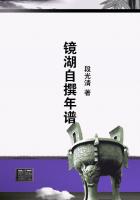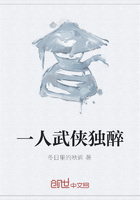He was so startled that he took a step backward. She remained with her hand outstretched.
Was that only the result of the eloquent expression of his views--that outstretched hand which was offered to him for an instant only as a symbol of its withdrawal from him forever?
"You cannot mean----"
"Good-by," said she.
"Have I not explained all that seemed to you to stand in need of explanation?" he asked.
"The book--the book remains. I asked for no explanation," said she.
"But you are too good, too reasonable, to dismiss me in this fashion, Phyllis. Why, even the bishop--/would sit upon a fence to see how the book would be received by the public before taking action against the author/," was what was in his mind, but he stopped short, and then added a phrase that had no reference to the bishop. "Can you ever have loved me?" was the phrase which he thought should appeal to her more forcibly than any reference to the bishop's sense of what was opportune.
She took back her hand, and her eyes fell at the same moment that her face flushed.
He felt that he had not been astray in his estimate of the controversial value--in the eyes of a girl, of course--of the appeal which he made to her. A girl understands nothing of the soundness of an argument on a Biblical question (or any other), he thought; but she understands an appeal made to her by a man whom she had loved, and whom she therefore loves still, though something may have occurred to make her think otherwise.
"Can you ever have loved me?" he said again, and his voice was now more reproachful.
There was a pause before she said:
"That is the question which I have been asking myself for some time--ever since I read about that book. Oh, please, Mr. Holland, do not stay any longer! Cannot you see that if, after you have made an explanation that should satisfy any reasonable person, I still remain in my original way of thinking, I am not the woman who should be your wife?"
"You would see with my eyes if you were my wife," he said, and he believed that she would, so large an amount of confidence had he in his own power to dominate a woman.
"Ah!" she said, "you have provided me with the strongest reason why I should never become your wife, Mr. Holland."
"Do not say that, Phyllis!" he cried, in a low voice, almost a piteous voice. "I must have you with me in this great work which I feel has been given me to accomplish. I am prepared to make any sacrifice for the cause which I have at heart--the cause to which I mean to devote the rest of my life; but you--you--I must have you with me, Phyllis.
Don't give me an answer now. All I ask of you is to think over the whole matter from the standpoint of one who loves the truth, and who does not fear the result of those who are investigators. A few years ago the geologists were regarded as the enemies of the faith. Later the evolutionists were looked on with abhorrence. Had any clergyman ventured to assent to that doctrine which we now know to be the everlasting truth of the scheme of earthly life propounded by the Creator, he would have been compelled to leave the Church. I do not know what will happen to me, my Phyllis. No, no! do not say anything to me now. All that I ask of you is to think--think--think."
"That is it--that is your modern scientific spirit!" she cried. "You, and such as you, say 'think--think--think' to us--to poor women and men who are asking for comfort, for protection against the evil of the world. You say 'think--think--think,' when you should say pray--pray--pray.' Where are you going to end? you have begun by taking from us our Bible. What do you propose to give us in exchange for it? No--no, don't answer me. I did not mean to enter into the question with you--to enter into any question with you. I have no right to do so."
"You have every right, Phyllis. If I should cause offence to the least of the little ones of the flock with which I have been intrusted, it would be better that a millstone were hanged round my neck and that I were cast into the sea. You have a right to ask and it is laid on me to answer."
"Then I decline to avail myself of the privilege; I will ask you nothing, except to say good-by."
"I will not say it, Phyllis, and I will not hear you say it. Three months ago you told me that you loved me."
"And I fancied that I did, but now----"
"Ah! you think that you have the power to cease loving at a moment's notice? You will find out your mistake, my child. In love there are no good-bys. I take your hand now, but not to say good-by; I feel that you are still mine--that you will be mine more than ever when you think--think--and pray."
"Ah! You ask me to pray?"
"Pray--pray for me, child. I need the prayers of such as you, for I feel that my hour of deepest trial is drawing nigh. Do you fancy that I am the man to take back anything that I have written? Look at me, Phyllis; I tell you here that I will stand by everything that I have written. Whatever comes of it, the book remains. Even if I lose all that I have worked for,--even if I lose you,--I will still say 'the book remains.' I am ready to suffer for it. I say in all humility that I believe God will give me grace to die for it."
She had given him her hand. He was still holding it when he spoke his final sentence, looking, not into her face, but into a space beyond it. His eyes more than suggested the eyes of a martyr waiting undaunted for the lighting of the fagots. Suddenly he dropped her hand. He looked for a moment into her face. He saw that the tears were upon it. He turned and walked out of the room without a word.
No word came from her.
He knew that he had left her at exactly the right moment. She was undoubtedly annoyed by the publication of the book; but that was because she had read some reviews of it, and was, girl-like, under the impression that the murmur of the reviewers was the mighty voice that echoes round the world. He felt that she would think differently when his real persecution began. He looked forward with great hope to the result of his real persecution. She would never hold out against that.















